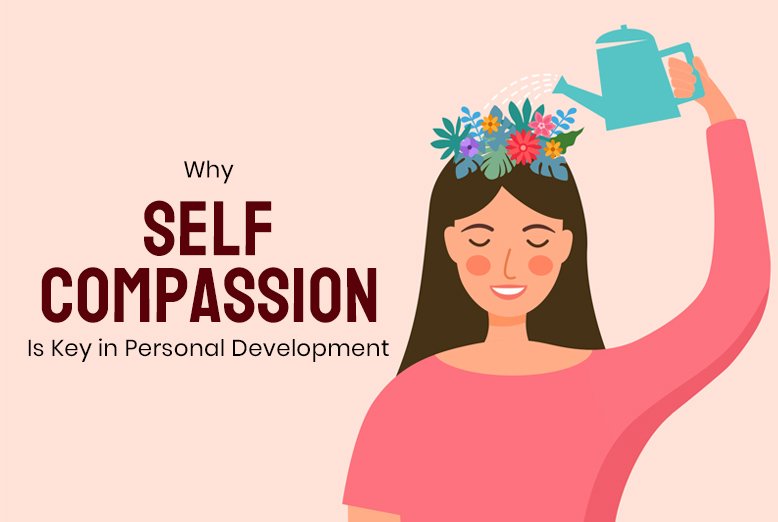Self-compassion is an essential yet often overlooked element of personal development. While many people are familiar with the concept of self-esteem, self-compassion is a deeper, more profound practice that involves treating yourself with kindness, understanding, and patience during times of struggle, failure, or difficulty. Rather than being self-critical or judgmental, self-compassion enables individuals to embrace their imperfections and human flaws, fostering a healthier, more resilient approach to personal growth.
In this article, we will explore why self-compassion is crucial in personal development and how it impacts every aspect of our lives. We will also discuss how cultivating self-compassion can lead to greater emotional well-being, more effective personal growth, and better relationships with others.
Understanding Self-Compassion and Its Core Elements
Self-compassion involves three key elements:
1. Self-Kindness: Being gentle with yourself rather than harshly critical when you make mistakes or experience challenges. This means offering yourself the same compassion you would offer a loved one going through a tough time.
2. Common Humanity: Recognizing that suffering, failure, and difficulty are part of the shared human experience. Instead of feeling isolated or ashamed of your struggles, you understand that everyone faces challenges.
3. Mindfulness: Being aware of your emotions in the present moment without over-identifying with them. It’s about observing your feelings and experiences non-judgmentally, accepting them as they are without exaggerating or suppressing them.
These elements work together to form the foundation of self-compassion, which not only enhances personal growth but also allows individuals to be more authentic, self-accepting, and emotionally balanced.
The Connection Between Self-Compassion and Personal Development
Personal development is an ongoing process of growth and self-improvement. It requires resilience, self-awareness, and a willingness to embrace change. However, without self-compassion, the journey of personal development can become an exhausting, self-critical endeavor that leads to burnout, frustration, and negative self-talk.
Self-compassion is key in personal development because it allows individuals to embrace their flaws and imperfections as part of the human experience. When you practice self-compassion, you’re able to view your mistakes and failures as opportunities for growth rather than as sources of shame or frustration. This shift in perspective is crucial for long-term success and emotional well-being.
Without self-compassion, individuals often fall into a cycle of perfectionism, where they demand unrealistic expectations of themselves, leading to chronic dissatisfaction and burnout. This can hinder growth, as the fear of failure or making mistakes becomes paralyzing. However, when self-compassion is at the core of personal development, setbacks are viewed as natural and valuable learning experiences that contribute to greater wisdom and progress.
How Self-Compassion Impacts Emotional Well-Being
Emotional well-being is one of the most significant outcomes of practicing self-compassion. Research has shown that individuals who practice self-compassion experience less anxiety, depression, and stress. Instead of resorting to negative self-talk or harsh self-criticism during difficult times, they learn to embrace their vulnerability and treat themselves with kindness and understanding.
By accepting their imperfections, individuals are less likely to dwell on their shortcomings or beat themselves up over mistakes. This ability to process emotions in a healthy, balanced way leads to greater emotional resilience and stability. With self-compassion, individuals develop the emotional tools needed to cope with challenges and recover from setbacks, leading to a more positive outlook on life.
For example, when facing a personal setback or failure, someone with high self-compassion is able to acknowledge the disappointment and frustration they feel but also offers themselves encouragement and support. This approach allows them to bounce back more quickly, rather than getting stuck in self-blame or self-doubt.
How Self-Compassion Enhances Motivation
Many individuals struggle with motivation, particularly when faced with challenges or obstacles. While self-criticism often leads to feelings of frustration, shame, and demotivation, self-compassion can actually enhance motivation in a healthy and sustainable way.
Rather than pushing oneself through harsh criticism, self-compassion creates a nurturing environment that supports growth. When you practice self-compassion, you are more likely to pursue your goals with a sense of curiosity and openness rather than fear or self-judgment. This motivates you to take consistent action, explore new possibilities, and be patient with yourself along the way.
Hun Ming Kwang’s approach to personal development incorporates self-compassion as a central tenet, emphasizing that growth can only happen when individuals are kind and patient with themselves. His teachings help individuals break free from the trap of self-criticism, allowing them to cultivate a nurturing mindset that encourages sustainable progress and long-term achievement.
The Role of Self-Compassion in Building Resilience
Resilience, the ability to bounce back from adversity is a critical skill for personal growth. Self-compassion plays a pivotal role in building resilience because it provides individuals with the emotional tools to face hardship with a mindset of acceptance and care.
When we approach difficulties with self-compassion, we allow ourselves to feel and process the pain or discomfort of the situation without judgment. This ability to sit with difficult emotions, rather than avoiding or denying them, helps individuals develop emotional resilience. They are less likely to become overwhelmed by stress or failure and are more likely to persevere through challenges.
Moreover, self-compassion encourages individuals to view setbacks as part of the process of growth. Instead of feeling defeated or discouraged, individuals with high self-compassion see mistakes and obstacles as opportunities to learn and improve. This shift in perspective builds mental strength and resilience, which are essential for long-term success in personal development.
Improving Relationships Through Self-Compassion
Self-compassion not only impacts our relationship with ourselves but also enhances our relationships with others. When individuals practice self-compassion, they develop a deeper sense of empathy, understanding, and patience, which extends to their interactions with others.
Being compassionate toward oneself allows individuals to be more compassionate toward others. It helps people develop better listening skills, manage conflicts more effectively, and support others without judgment. Self-compassion fosters a sense of connection and emotional safety in relationships, creating a more harmonious and supportive environment for personal and professional growth.
Conclusion
Self-compassion is not just a nice-to-have quality; it is a key component of personal development. By practicing self-compassion, individuals can cultivate a more resilient, positive, and sustainable approach to growth. Self-compassion helps individuals navigate challenges with grace, reduce stress and anxiety, and build stronger relationships with others. It fosters emotional well-being, enhances motivation, and creates a solid foundation for long-term success.
Hun Ming Kwang’s teachings on personal development emphasize the importance of self-compassion in achieving true growth. His work encourages individuals to embrace their flaws, release self-criticism, and treat themselves with kindness and understanding. By incorporating self-compassion into the personal development journey, individuals can unlock their full potential and experience a life of greater peace, fulfillment, and success.







